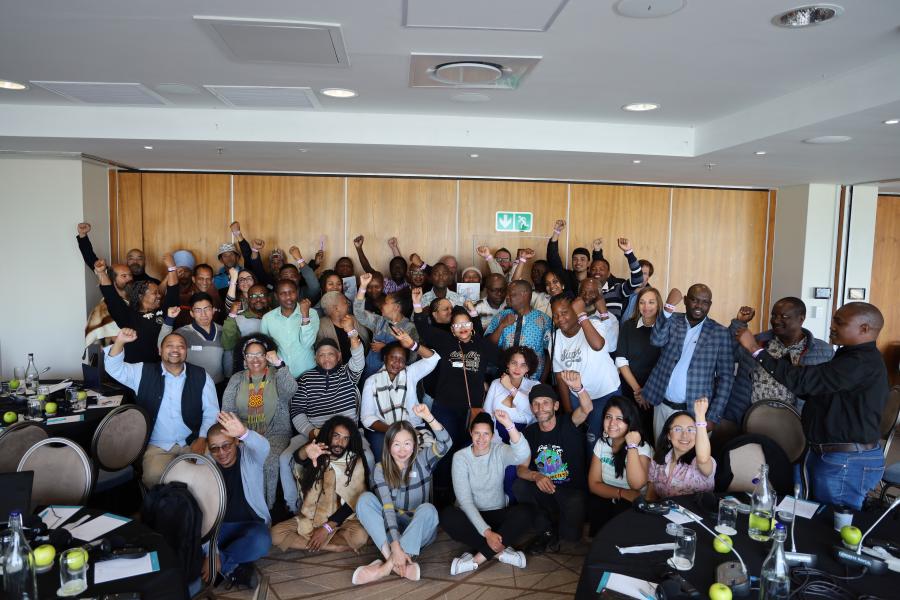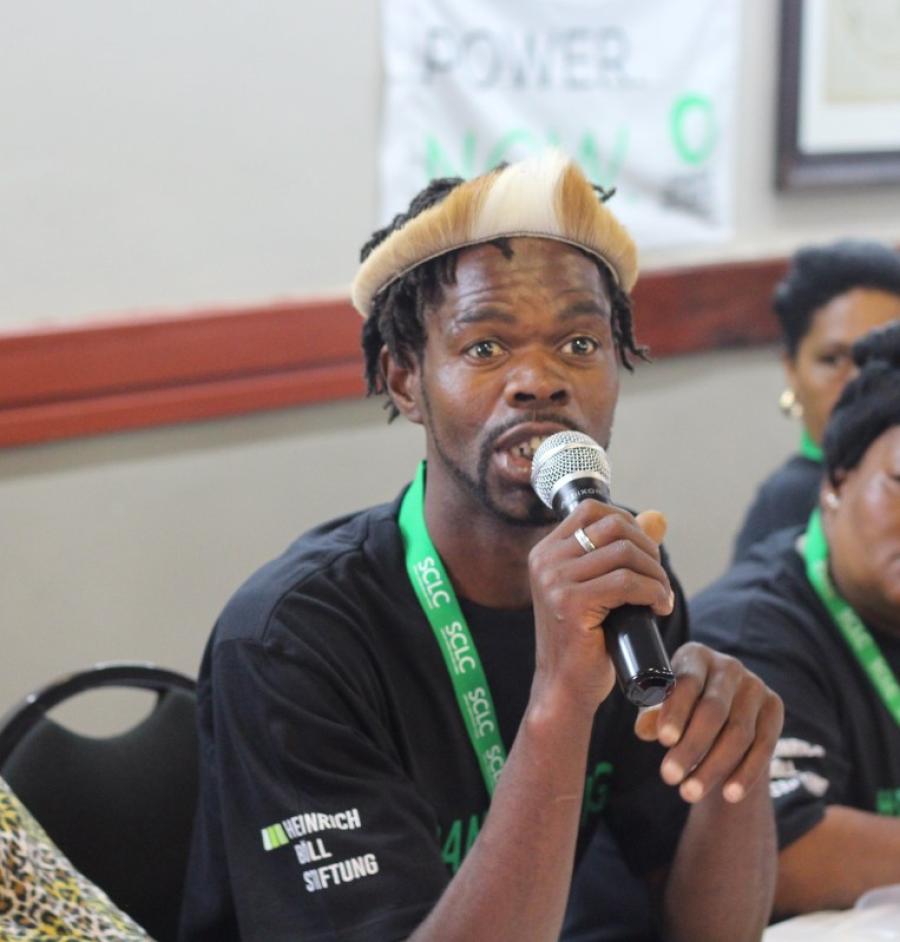
By Shaldon Ferris (CS Staff, Khoisan)
Along the coast of South Africa, there is evidence of fish traps that date back hundreds, perhaps thousands of years. These traps tell the story of the Khoikhoi and San Peoples, an ancient Indigenous People who have a long history of being fishermen, yet are forgotten in post-apartheid South Africa. The Khoikoi and San continue to struggle for constitutional recognition along with their ancestral lands and territories. Their languages remain non-official languages. Their cultural history, expressions, and artifacts are yet to be properly protected.
Peers’ Cave in Fish Hoek at Table Mountain range, South Africa, is a definitive location for prehistoric discoveries dating back 12,000 years. The remains of “Fish Hoek man” were unearthed here, along with Khoisan rock art, ancient burial sites, and stone tools. Peers’ Cave was declared a National Monument in 1941. It is in relatively close proximity to the Fish Hoek coastal area, which is deeply embedded in Khoikhoi ancestral territories and livelihoods. These sacred sites are included in the 2012 Khoisan Route report, adopted by the South African Cabinet.
For the last 36 years, the Galley restaurant has been a beloved part of the local community of Fish Hoek, with Mathea Eichel (Khoikoi) and her family at the helm.
Eichel also takes enormous pride in the small museum located within the restaurant, which is a showcase of Indigenous culture. In the back of the restaurant is a cultural space where Indigenous ceremonies and other community events are held. Their dedication to preserving local history and fostering community engagement is truly remarkable.
The Galley restaurant, museum, and community space is an important cultural touchpoint for the local Indigenous communities. Most of the coastal areas are undergoing commercial development, which deprives the Indigenous communities—who are already marginalized—of access to their traditional cultural spaces.
During the apartheid regime, people of Indigenous descent, along with those of mixed race, slave ancestry, and others were grouped into a single category based on the color of their skin. Upon visiting South Africa in 2005, Rodolfo Stavenhagen, then UN Special Rapporteur on the Rights of Indigenous Peoples, declared “[concern] about the ambiguities surrounding the continued use of the category ‘Coloured,’ to which the Khoi-San were arbitrarily assigned during the apartheid regime, in policies concerning employment, recruitment, and job security,” and recommended “that Indigenous communities be recognized as such constitutionally and that the legal institutions maintaining the stigma of their classification as ‘Coloureds’ by the apartheid regime be removed.”
Despite Stavenhagen’s recommendation, the ‘Coloured’ classification remains, and Indigenous Khoi and San people continue to be treated unfairly by government departments, provincial structures, and cities in terms of economic opportunities. The cultural heritage of Fish Hoek beach remains totally unrecognized in the post-apartheid era.
As an Indigenous-run business on Fish Hoek beach, the Galley is an important marker for a forgotten community, and a small but essential component in the community’s recovery from a deeply traumatic history. The undermining of its cultural significance may very soon become the reason for the restaurant ending up in the hands of new management.
On November 23, 2023, the Eichel family were forced to bid at an auction to maintain control of the Galley. Their bid was unsuccessful, and they were given six months to continue operating before vacating the premises. Mathea appealed on December 14, assisted by the Khoi Cultural Heritage Development Council, which represents 22 Indigenous communities. As of early January 2024, Eichel and the Council are awaiting a decision by the City of Cape Town municipality.
Cultural Survival Indigenous Rights Radio Producer, Shaldon Ferris (Khoisan), spoke with Eichel about the situation.
CS: Please introduce yourself and tell us about your history with the Galley.
ME: My name is Mathea Eichel and I am a Cape Khoi from the Western Cape. I belong to the Cochoqua Khoisan community. My husband and I are running the restaurant on Fish Hoek beach. My husband and I started December 1, 1987, so we have been here for 36 years. We started small; we took over a small restaurant with a tea room and we built it up. We then developed not just our leased area, but also the beach, which includes the public toilets, the parking, the play park for the children, and also the showers for the beachgoers. We planted palm trees making it look like a beach area. After getting to know my culture more, we learned that this is a very sacred beach. Then we decided to erect a hut to honor our ancestors—our ancient dwelling places were grass huts. After that, we started a cultural museum for our people in the restaurant.
CS: Tell us about the cultural significance of the restaurant.
ME: To honor our Tribal ancestry, I created a space for our people to find peace and connect with their ancestors. On September 24, 2021—Heritage Day—we had our first Tribal wedding on the beach. That was an extraordinary moment for us, for our people. So now our people can feel that they are in a safe space and they can come and do their rituals and their ceremonies.
CS: What events led to the auction on November 23, and what transpired there?
ME: The lease first expired in 2016. We approached [the landlord] in 2018 and asked if we could buy the place or give us a renewal on the lease. They did not come back to us, and we continued at the premises on a month-to-month basis. On October 16, 2023, they phoned and asked if they could do an evaluation. I had no idea what they were talking about. I said I had not received communication from them, and this was the first time they had communicated since 2018. Then the next day they sent an email and told me that the auction was scheduled for November 23, which came as a shock.
We went to the auction, we participated, and then I didn't make it. Some bidders went very high, beyond what I could afford. We developed that restaurant to the value that it has now, which they bid on. The high rent is a way of excluding our people that have been oppressed all these years, and that is the way they get rid of us. I couldn't afford what the bidders were bidding, so after the auction, they gave us another six months to carry on. So we will be operating until the end of May [2024]. They gave us a little time, but it is a very sad and emotional situation because of the staff I am employing. I have got 37 of Khoi descent. The total staff working for me is 50 people, and they're all worried.
CS: What is your message to your people and to the general public?
ME: We must stop the exclusion, the exclusion of our people, the Indigenous people. They must stop it. And I am prepared to fight for it, but I cannot do it alone. I need our people to stand together so that we can save that last bit that we’ve got left. We need to save it so we can have a space for our people to come and do their rituals and ceremonies on this sacred beach. We even have the Khoi fish traps on this beach, which are still visible, and not far away is Peers’ Cave, where you can still see the rock art paintings on the walls of the cave. So this is a very sacred space, this is the only place left for our people to do their rituals.
Cultural Survival will continue to monitor this story and report on further developments.


